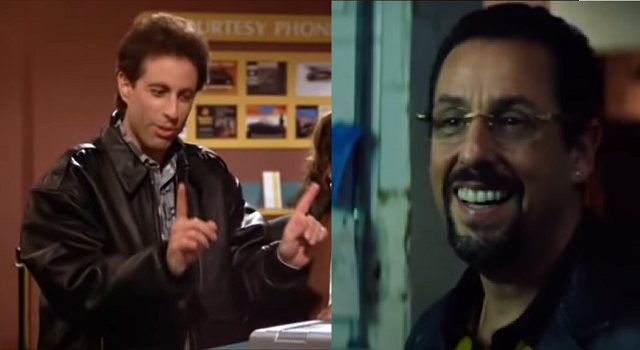SPOILERS FOR UNCUT GEMS LIE AHEAD
In season three, episode eleven of Seinfeld, the title character makes a reservation for a car rental, only to show up to the rental place and discover they had not actually reserved the car for him. He proceeds to sarcastically explain the concept of renting a car to the woman behind the counter; she insists she knows how car rental works, to which he replies, “I don’t think you do. If you did, I’d have a car right now.” It is a dizzying, beautiful moment of ownage up there with Walter White saying “I won,” or Vic Mackey comparing the taste of a woman’s vagina to sweet butter. Deliberately breaking reservations is a common and deeply unethical practice in the car rental industry, so there is the satisfaction of seeing someone getting insulted for something real people do, but it’s also a fantastic example of casual and effective social ownage – perhaps the most brutal way of owning someone without physical violence, and I know this because in thinking about the scene, I realise how often I’ve done it and how badly people take it.
The line says, in essence, your espoused self-image is incorrect and here are clear facts why. It’s scientifically proven that facts are the absolute worst way to change a person’s mind because we get a rush of dopamine out of being right in the face of opposition. Being able to tell yourself you are the last honourable, intelligent person in a world gone wrong feels so much better than admitting you were wrong. So if your goal is to own someone, the only more humiliating experience than undeniable proof that your very conception of the world is unfounded is that your conception of yourself is unfounded. Of course, if your highest goal isn’t to humiliate or destroy someone but to get them to change their behaviour to one that you want, then ownage is literally the worst thing you could possibly do. The clerk’s behaviour is probably realistic for someone working in the industry, but more often than not people will just escalate right back.
“I disagree” is one of the most famous lines from the incredibly memeable Uncut Gems. Howard places a bet that even someone as skeptical about the pleasures of gambling as I can recognise as ludicrous and convoluted. Now, I remembered this scene as having the bookie break down why the bet was ludicrous, but he simply describes it as “the dumbest fucking bet I’ve ever heard of”, to which Howard simply uncomfortably smiles and says “I disagree. I disagree, Gary.” That is the dopamine rush of stubbornly being right in the face of opposition, and it’s the only social ownage of equal power to “I don’t think you do,” which is why it happens so often, especially in online discourse, and especially in discussing morality and right vs wrong. It’s almost exactly the same thing as “I don’t think you do,” in terms of breaking someone’s self-image – they see themselves as a rational actor in a rational world, they are giving you a rational and obvious breakdown, and you are casually rejecting it without even explanation as if you know something they don’t. Responding to an “I don’t think you do” with another “I don’t think you do” is effectively playing the same game as someone else; responding with a simple “I disagree” puts you on a level above them.
Of course, Uncut Gems is another example of a movie where people ignored the broader consequences of the story for single actions they identify with. Howard’s whole arc is of him burning up every relationship he has to chase goals that only he understands with only limited explanation or interest in how it affects others (indeed, he seems actively frustrated whenever anyone tries). Even when he’s ultimately proven not just correct but spectacularly so – when he has made himself and others into millionaires – he has so frustrated some of the people he works with that one of them straight shoots him in the head at the first opportunity; exaggerated and violent but emotionally resonated with what tends to happen to people who act like Howard. If you prioritise being right over your relationships, then you’ll be right at the cost of your relationships.

